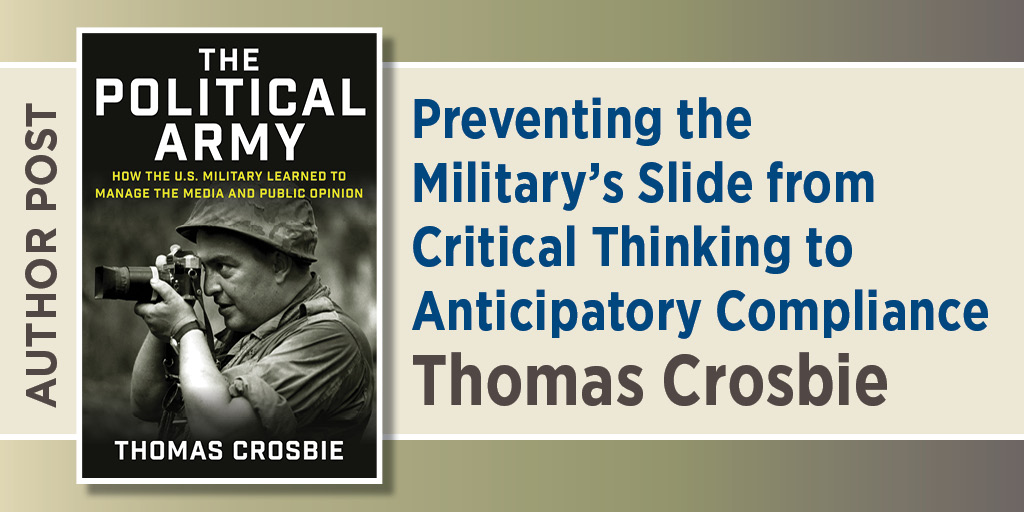Preventing the Military’s Slide from Critical Thinking to Anticipatory Compliance Thomas Crosbie
Thomas Crosbie

Future historians will point to the ten days between President Donald Trump’s firing of Chairman of the Joint Chiefs of Staff General C. Q. Brown Jr. on February 22, 2025, and Trump’s speech to a joint session of Congress on March 4, 2025, as the days in which American civil-military relations walked the razor’s edge between democracy and the slow descent into authoritarianism.
During these ten critical days, perhaps America’s military leaders were asking themselves a troubling question: Will we resist the president’s will to shred civil-military norms, or will we be his “willing executioners” (to borrow a phrase from historian Daniel Goldhagen)?
The question was answered ended on March 5, when the Department of Defense’s overwhelming commitment to enact the president’s will began to flood through the system. By the end of the day, the nearly three million DOD employees had no doubts that the senior leadership would willingly execute Trump’s purge. The most visible signal of this intent was the removal of masses of digital content based on military-run websites with variations on the following vague disclaimer: “Content was removed to align with the President’s executive orders and DoD priorities in accordance with DoD Instruction 5400.17.”
The consequences have been at once comic and tragic. The comedy can be found in some of the collateral damage; for example, photos of the Enola Gay were being removed due to the word “gay” triggering an automated flag. The tragedy, less widely discussed, is that the order effectively serves as the death knell of critical thinking in the Department of Defense. Anything that President Trump and his loyalists dislike must be silenced and removed.
The use of DOD Instruction 5400.17 to force military websites to remove masses of content from military websites is the most flagrantly inappropriate, explicitly partisan, and overtly corrupting political action taken by DOD leadership in the history of U.S. military public affairs.
In my book The Political Army: How the U.S. Military Learned to Manage the Media and Public Opinion, I chart the painful process whereby the U.S. Army and other parts of the DOD learned how to exert control over the information environment. I concluded that the Army and other armed services have an active (not passive) role to play in supporting democracy.
Let us be clear. The use of DOD Instruction 5400.17 to force military websites to remove masses of content from military websites is the most flagrantly inappropriate, explicitly partisan, and overtly corrupting political action taken by DOD leadership in the history of U.S. military public affairs. It is the clearest signal that the military profession can send to Trump that it has abandoned its nonpartisan role and is now fully on board with the president’s mission to upend the global order and amass personal power.
Removing such content is an explicit breach of the very order it claims to uphold, as senior leaders and their public affairs advisors well know. Specifically, Section 3, Part F advises DOD personnel of the following: “Social media account managers will not remove social media content from official DoD accounts unless there is a factual or typographical error; violation of a law, policy, term of service, or user agreement; or an operations or information security concern.”
There is nothing appropriate or legitimate about a mass deletion of content.
The reason that the DOD is committed to information transparency is because the DOD has learned that hiding things is counterproductive to military readiness and contrary to the sprit of the Constitution. Indeed, Instruction 5400.17 states this emphatically: “Removal of content can unintentionally discredit DoD information if the action appears to be taken to (1) avoid embarrassment, stifle or silence discussion about a controversial topic, or (3) mislead users to believe an issue is inconsequential or of minor significance.”
There is nothing appropriate or legitimate about a mass deletion of content. Furthermore, the process has been so clumsy in its execution that the story of the Enola Gay was deleted from the military’s websites. While such behavior only incurs embarrassment, it is clearly intended to stifle or silence discussion, and it is clearly intended to mislead users of the various websites.
By supporting Trump and Hegseth’s requests to strip information from military websites, the assistant secretary of defense for public affairs, the DOD chief information officer, the service chiefs, and all public affairs officers comply are clearly (and, I assume, purposefully) in breach of the spirit of the DOD’s information policy. The American public should be outraged at the failure of the military profession to honor its commitment to the Constitution.
If critical thinking is universally espoused by America’s military leaders as a good thing,…, why has the DOD been so quick to signal its commitment to the opposite…
Ironically, the high intellectual standards of the American military has, for decades, been the envy of the world. The U.S. Professional Military Education system has produced generations of brilliant critical thinkers. The primary reason the DOD has invested so much time and effort into this endeavor is because there is universal agreement among experts that critical thinking—the intellectual edge—is essential for success on the battlefields of the future. Indeed, it is the intellectual rigor of the officer corps that is intended to counterbalance the immense advantage in size enjoyed by the United States’s current main competitor, China.
If critical thinking is universally espoused by America’s military leaders as a good thing, and it is widely understood by the experts as a critical enabler of military readiness, why has the DOD been so quick to signal its commitment to the opposite, instead slavishly following poorly conceived, contradictory, and unconstitutional directions from Hegesth and Trump?
The DoD appears set on replacing critical thinking with anticipatory compliance, a pathological behavior described by Tim Snyder in his book On Tyranny. Indeed, Trump’s skill lies in short-circuiting critical thinking while accelerating anticipatory compliance. Notably, so does Elon Musk, whose star has risen quickly within Trump’s inner circle. Both behaviors? are cultish in the extreme, and both notably feature what psychiatrist Robert Jay Lifton describes as “thought terminating clichés,” which he defines as “brief, highly reductive, definitive-sounding phrases, easily memorized, and easily expressed.”
Trump’s skill lies in short-circuiting critical thinking while accelerating anticipatory compliance.
Trump’s political fortunes have derived largely from energizing a base of fanatic loyalists who accept his constant transgression of norms as further evidence of his sincerity to wrestling the country out of the control of elites and placing it back in the hands of the people. Those outside the cult struggle to understand how Trump’s followers could believe this narrative. However, Trump’s loyalists have a thought-terminating cliché that prevents such quibbles taking hold: Skeptics are told to simply “do your research.” The research they have in mind is mired in conspiracy and radical doubt, lacks evidentiary standards, is flagrantly at odds with common sense, and often differs widely in its conclusions from one loyalist to another. Trump’s thought-terminating cliché has the added attraction in that it connects directly to the deeply rooted distrust of authority that has marked American political culture for centuries.
Meanwhile, Musk has spent the past decade developing a cultish following of his own. The logic of this cult is different from the MAGA cult, and it is structured around a different thought-terminating cliché. His cliché is, on the surface, quite odd. It’s the idea that any form of resistance to norms or any departure from expected behavior is “just trolling.” For Musk’s followers, Musk is “just trolling” when he names a government organization after a meme, as he did with the Department of Government Efficiency (named after the Dogecoin, originally named as a joke, that Musk supported). Notably, “just trolling” links directly to the same well-spring of distrust exploited by MAGA.
We live in a new age of American security, an age of imminent and perhaps permanent decline. Trump’s avowed preference to work with authoritarian leaders, his undermining of the security of allies and neighbors, and his mass firings of government workers are all unmistakable signals that the president is dedicated to ending the existing security regime. It is almost impossible to imagine resistance of any sort from military leaders steeped in the belief that they play no positive role in politics and caught between Scylla and Charybdis: that “Trump is really an American patriot, do you research” or “actually, he’s just trolling.” That being said, the vast majority of American servicemembers have already learned how to be critical thinkers and have already gained a critical understanding of their obligations to the Constitution. The DOD’s million employees must not let two bad actors corrupt their great institution.
Thomas Crosbie is associate professor of military operations at the Royal Danish Defence College and the author of The Political Army: How the U.S. Military Learned to Manage the Media and Public Opinion.
Categories:American HistoryAuthor-Editor Post/Op-EdHistoryJournalismMedia Studies
Tags:Anticipatory ComplianceCivil-Military RelationsCritical ThinkingdemocracyDepartment of DefenseDODDonald TrumpMedia ManagementmilitaryStay InformedThe Political ArmyThomas CrosbieTrumpTrump AdministrationU.S. MilitaryUS HistoryUS MilitaryUS Military History





